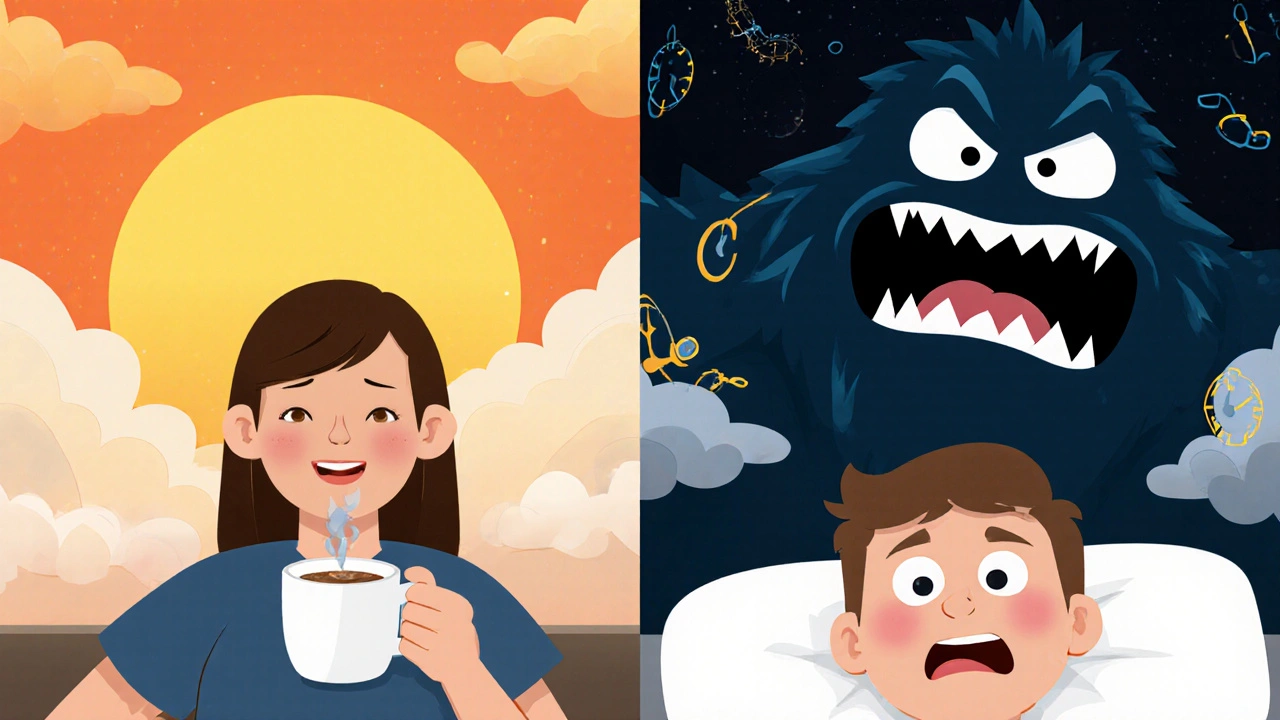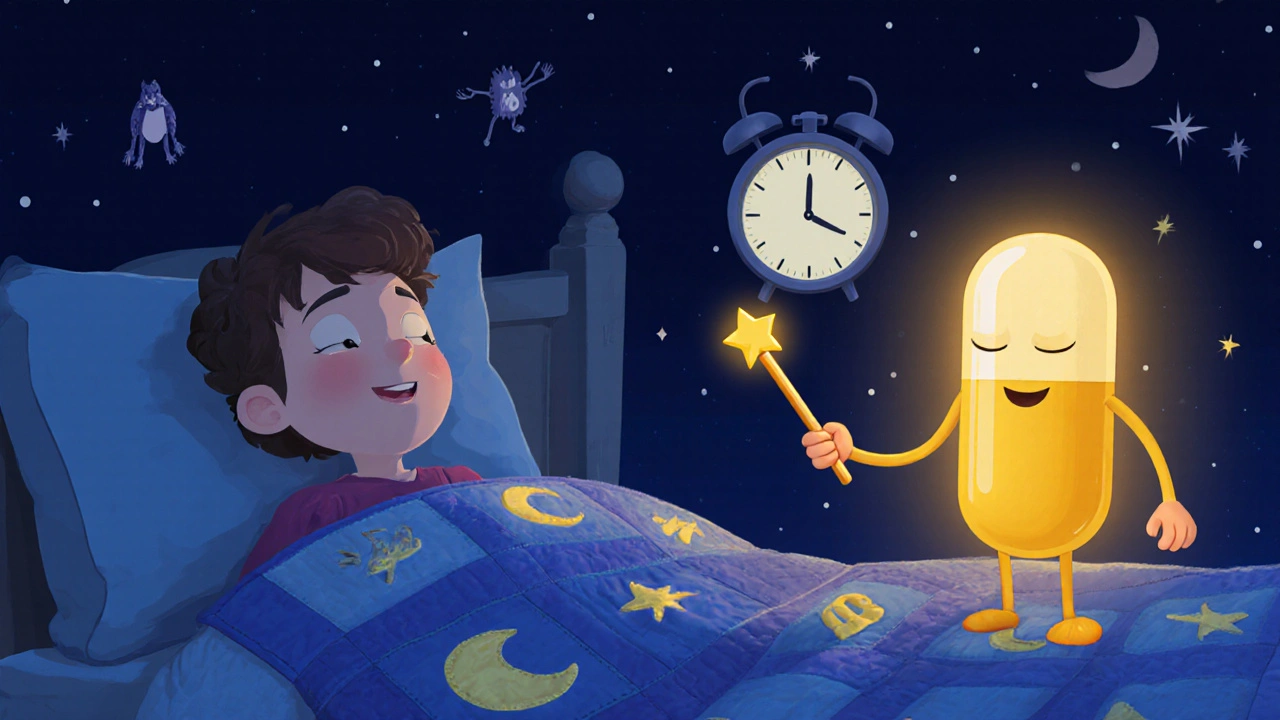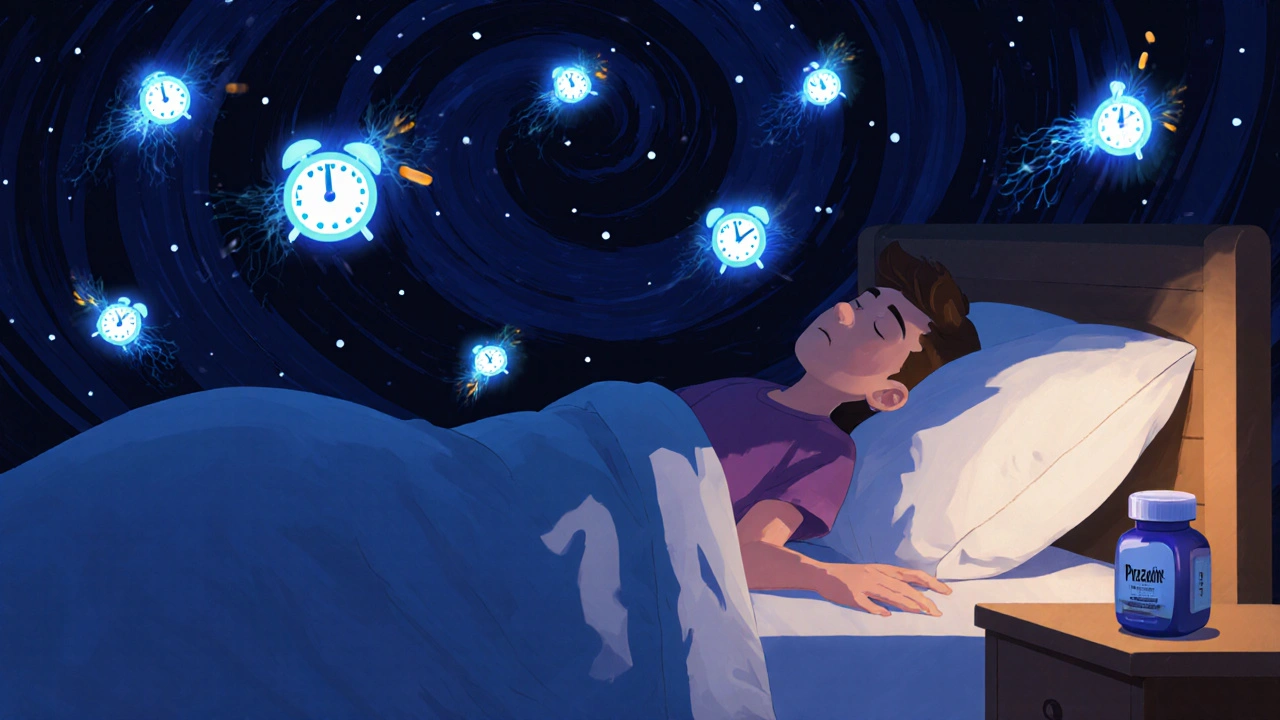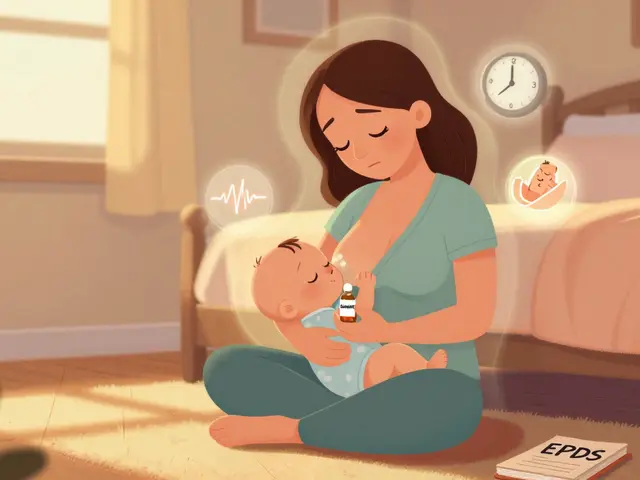Antidepressant Sleep Match Calculator
Enter your sleep and depression details above to see personalized recommendations.
Why Your Antidepressant Might Be Keeping You Awake
It’s not just in your head. If you started an antidepressant and suddenly can’t fall asleep-or you’re sleeping too much and still feel exhausted-you’re not alone. About 70% of people with depression also struggle with sleep problems, and the very meds meant to help their mood can make sleep worse before they make it better. This isn’t a flaw in the treatment. It’s a known effect of how these drugs work in the brain.
Antidepressants change levels of serotonin, norepinephrine, and dopamine. These chemicals don’t just affect mood-they control your sleep-wake cycle. Some antidepressants suppress REM sleep, the stage where dreaming happens. Others make you drowsy. Some do both. The result? You might feel wired at night, groggy in the morning, or wake up multiple times without knowing why.
Which Antidepressants Are Most Likely to Cause Insomnia?
Not all antidepressants affect sleep the same way. SSRIs like fluoxetine (Prozac), sertraline (Zoloft), and paroxetine (Paxil) are the most common culprits for sleep trouble. In the first two weeks, up to 78% of people taking fluoxetine report trouble falling or staying asleep. Sertraline isn’t far behind at 65%. These drugs reduce REM sleep by nearly a third and push back the time it takes to enter REM by over an hour.
Why? Serotonin suppresses REM sleep. The more serotonin your brain has-especially early in treatment-the less REM you get. That might sound good if you’re having nightmares, but REM is crucial for emotional processing. When it’s blocked, your brain doesn’t get the rest it needs, even if you’re technically sleeping.
Bupropion (Wellbutrin) is another big one. It’s not an SSRI, but it’s activating. It boosts dopamine and norepinephrine, which keeps you alert. Many people take it for energy, but if you’re already struggling with insomnia, it can make things worse. Combine it with an SSRI? That combo has been linked to a 2.4 times higher risk of severe insomnia, according to FDA data.
Antidepressants That Actually Help You Sleep
Not all hope is lost. Some antidepressants are prescribed specifically because they help with sleep-not despite their side effects, but because of them.
Mirtazapine (Remeron) is the top pick for people with depression and insomnia. At low doses (7.5-15 mg), it blocks certain serotonin receptors that keep you awake. In clinical trials, it added 53 minutes to total sleep time and cut the time to fall asleep by nearly half an hour. About 81% of users on Reddit reported better sleep, but 63% said they felt too sleepy during the day-especially at doses above 30 mg.
Trazodone is often used off-label as a sleep aid. At 25-50 mg at bedtime, it reduces nighttime wake-ups by 37%. It’s not addictive like benzodiazepines, but many users report a “hangover” feeling the next morning. One patient described it as “sleeping like a log, then waking up like I’d been hit by a truck.”
Agomelatine is newer and works differently. It mimics melatonin, helping reset your body clock. In a 2024 study, it outperformed escitalopram in improving both mood and sleep continuity. It reduces REM suppression by more than half compared to SSRIs, making it one of the gentlest options for sleep architecture.

Timing Matters More Than You Think
When you take your pill can be just as important as which one you take.
For activating antidepressants like SSRIs, bupropion, or venlafaxine, taking them before 9 a.m. reduces insomnia risk by 41%. A 2020 study showed that people who took their SSRI at noon had nearly twice the chance of nighttime wakefulness compared to those who took it at 7 a.m.
For sedating ones like mirtazapine or trazodone, take them 2-3 hours before bed. Taking trazodone right before sleep can cause dizziness or nausea. Taking it too early might mean you’re groggy by morning. The sweet spot? Around 8 p.m. if you’re aiming for a 10 p.m. bedtime.
Even small changes help. One patient on Reddit split her 40 mg sertraline dose-20 mg in the morning, 20 mg at 3 p.m. She went from 3 hours of sleep to 6.5 hours. A clinical trial at the University of Michigan is now testing this exact approach.
What to Do When Sleep Gets Worse Before It Gets Better
Here’s the truth: For many SSRIs, sleep gets worse in the first 3-7 days. Then, slowly, it improves. By week 3-4, most people see a return to normal sleep patterns-even if they’re still on the same dose.
That doesn’t mean you should just tough it out. If insomnia is unbearable, talk to your doctor. Options include:
- Lowering the SSRI dose temporarily, then slowly increasing it
- Adding a short-term sleep aid like low-dose trazodone or doxepin
- Switching to mirtazapine or agomelatine if depression symptoms allow
- Using a sleep diary for two weeks to track patterns
Don’t stop your antidepressant cold turkey. Withdrawal can cause rebound insomnia worse than the original problem. Always taper under medical supervision.

Red Flags: When Sleep Changes Signal Something Serious
Some sleep issues aren’t just side effects-they’re warning signs.
REM sleep behavior disorder (RBD) happens when your muscles don’t relax during REM sleep. You might punch, kick, or yell in your sleep. Studies show 68% of SSRI users show signs of RBD on sleep tests, compared to 22% of non-users. If you or your partner notice this, tell your doctor. It’s linked to future neurological conditions like Parkinson’s.
Restless legs syndrome (RLS) is another red flag. SSRIs can trigger or worsen it. You’ll feel an urge to move your legs, especially at night. It’s not just discomfort-it’s a sleep-killer. If you develop RLS after starting an antidepressant, your doctor may switch you to mirtazapine, which has a lower risk.
Severe daytime fatigue, confusion, or muscle stiffness could signal serotonin syndrome, especially if you’re on multiple meds. This is rare but dangerous. Get help immediately if you feel this way.
What’s New in 2025: Personalized Sleep Matching
The future of antidepressant prescribing isn’t one-size-fits-all. In 2025, companies like Genomind launched a $349 genetic test that looks at 17 genes tied to sleep regulation. It can predict whether you’re likely to get insomnia from fluoxetine or sleep better on mirtazapine-with 82% accuracy in early tests.
Also, zuranolone (Zurzuvae), approved in 2023, is the first antidepressant designed specifically to improve sleep fast. In trials, it cut insomnia symptoms by 54% in just two weeks. It’s not for everyone, but it’s a sign that the field is finally treating sleep as a core part of depression care-not a side effect to tolerate.
Bottom Line: Your Sleep Matters
Depression and sleep are locked in a cycle. Poor sleep makes depression worse. Depression makes sleep worse. Antidepressants can break that cycle-or make it worse, depending on the drug, dose, and timing.
Don’t assume insomnia is just part of the process. Ask your doctor: “Which antidepressant has the best sleep profile for my symptoms?” If you have trouble falling asleep, mirtazapine or agomelatine might be better than an SSRI. If you sleep too much, an SSRI might be the right choice.
Track your sleep. Adjust timing. Don’t suffer in silence. The right antidepressant shouldn’t leave you exhausted or awake all night. It should help you feel like yourself again-including getting a good night’s rest.
Can antidepressants cause insomnia even if they’re supposed to help with sleep?
Yes. Some antidepressants, like SSRIs (fluoxetine, sertraline), can cause insomnia even though they’re used to treat depression. This happens because they affect serotonin, which suppresses REM sleep and increases alertness early in treatment. Even sedating antidepressants like mirtazapine can cause daytime drowsiness that disrupts nighttime sleep if the dose is too high. The key is matching the drug to your specific sleep pattern.
How long does insomnia last after starting an antidepressant?
For SSRIs, insomnia typically peaks between days 3 and 7 and starts improving after 2-3 weeks. By week 4, most people see better sleep even without changing the dose. But if insomnia lasts longer than 4 weeks or gets worse, it’s not normal. That’s when you should talk to your doctor about switching or adding a sleep aid.
Is mirtazapine better than an SSRI for sleep?
For people with depression and insomnia, yes-mirtazapine is often better. At low doses (7.5-15 mg), it improves sleep onset and total sleep time more than SSRIs. Studies show it increases sleep efficiency by 32% and adds nearly an hour of sleep per night. But it can cause next-day drowsiness, so it’s not ideal if you need to be alert during the day. SSRIs are better for people with oversleeping or low energy.
Should I take my antidepressant at night or in the morning?
For activating antidepressants like SSRIs, bupropion, or venlafaxine, take them in the morning-ideally before 9 a.m. This reduces nighttime wakefulness by 41%. For sedating ones like mirtazapine or trazodone, take them 2-3 hours before bedtime. Taking them too late can cause grogginess; too early can make you sleepy during the day.
Can I use melatonin with antidepressants?
Yes, melatonin is generally safe to use with most antidepressants. It can help reset your internal clock, especially if your sleep schedule is off. But it won’t fix insomnia caused by serotonin changes from SSRIs. It’s best used as a short-term support while your body adjusts to the antidepressant. Avoid high doses-1-3 mg at bedtime is usually enough.
What’s the best antidepressant for someone with both depression and insomnia?
Mirtazapine (7.5-15 mg at bedtime) is the top choice based on clinical guidelines and patient outcomes. It improves both mood and sleep without suppressing REM sleep like SSRIs do. Agomelatine is another strong option, especially if your sleep schedule is irregular. Trazodone (25-50 mg) is often used off-label but carries a risk of next-day sedation. Avoid SSRIs and bupropion if insomnia is your main problem.





One comment
OMG YES THIS. I was on Zoloft for 6 weeks and felt like a zombie by day and wide awake at 3am. Switched to mirtazapine 15mg and now I actually sleep through the night 😭💕
i swear trazodone is the secret weapon. took 25mg for 2 weeks, no more waking up 5x a night. yeah i felt like a sloth next day but worth it. dont take it too late tho, i learned the hard way
Just to clarify something: the REM suppression from SSRIs isn't always bad. For people with PTSD or chronic nightmares, reducing REM can be therapeutic. But yeah, for general depression with insomnia? It's a trap. Mirtazapine's histamine blockade is what makes it sleep-friendly, not just serotonin modulation. Also, agomelatine's MT1/MT2 agonism is way underutilized in the US. FDA approval doesn't mean doctors know how to use it.
i tried everything… melatonin, trazodone, even just moving my ssri to morning. nothing worked until i lowered my dose. my dr was skeptical but i was desperate. now i’m on 10mg sertraline instead of 50mg and i sleep 7 hours. no more panic waking up. 🤍
This is why I hate how doctors treat sleep like an afterthought. You wouldn’t prescribe a blood pressure med that makes your heart race and say 'just wait it out.' Sleep is not a side effect-it’s the foundation. If your med ruins your sleep, it’s not working. Period.
The data on mirtazapine is compelling, but I’ve seen patients gain 15+ pounds on it. For someone already struggling with body image due to depression, this can be devastating. I prefer a slow titration of low-dose SSRIs paired with CBT-I. It’s slower, but more sustainable.
You’re all missing the point. SSRIs don’t cause insomnia-they expose your underlying anxiety. The sleep disruption is your brain screaming that you’re not ready for this. You need to do trauma work first, not switch meds. I’ve seen 37 patients on different antidepressants-all had the same sleep issues until they did EMDR. Just saying.
I appreciate the thorough breakdown. One thing not mentioned: circadian rhythm alignment. Even if you take the right med at the right time, if you’re scrolling until 2am and waking up at noon, the neurochemistry won’t matter. Light exposure in the morning is non-negotiable.
Let’s be real. The pharmaceutical industry doesn’t care about your sleep. They want you on SSRIs because they’re patentable. Mirtazapine? Generic. Agomelatine? Not sold in the US because it’s too good. Zuranolone? $12,000 a month. They’ll keep pushing the same toxic SSRIs while marketing ‘sleep aids’ as add-ons. Wake up. This isn’t medicine-it’s profit-driven manipulation.
why do americans always think meds are the answer? i went to india for ayurveda and now i sleep like a baby. no pills just turmeric milk and breathing. you guys are too lazy to change your lifestyle